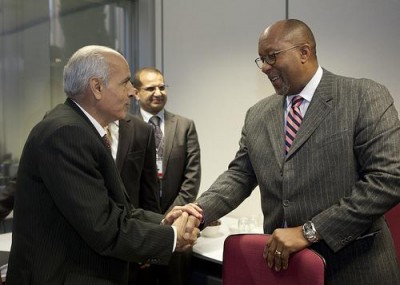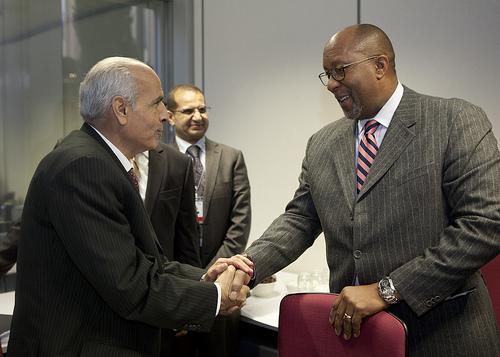On April 20, 2012, the Obama administration released the new model U.S. bilateral investment treaty (BIT), the template document that the United States uses as a starting point when negotiating a new BIT.[i] The new model is the output of a three-year review process that included gathering input from an official advisory committee.

U.S. Trade Representative Ron Kirk with Egyptian Trade Minister Dr. Mahmoud Eisa. Photo by Eric Bridiers.
Public interest organizations represented on the committee submitted an annex with 17 recommendations for the new model BIT. [iii] The table below lists these detailed recommendations and analyses the extent to which the new model reflects this input.
Overall Analysis of the New Model BIT
The new U.S. model BIT does not go far enough to address the concerns that labor unions and environmental, development, and other nongovernmental organizations have raised consistently for many years. Some primary examples:
Jobs, Capacity and Technology: The new model BIT does little to address the need to reverse the devastating impacts of offshoring on U.S. workers and communities. Instead it will continue to facilitate and accelerate the off-shoring of U.S. jobs, capacity and technology by providing sweeping protections for U.S. investments abroad, without commensurate investor obligations to adhere, for instance, to internationally recognized worker rights.
Democracy: The model BIT continues to allow private foreign investors to bypass domestic courts entirely and take claims related to laws and regulations developed through the democratic process directly to international tribunals. When challenges are successful, the host government is compelled to pay compensation to the investor, which may deter future adoption or enforcement of meaningful safety, worker, and environmental standards.
Environment: The new model BIT continues to allow foreign investors to sue over legitimate environmental and health and safety protections. Many governments, including the United States, have already had to spend millions of dollars defending against such investor-state claims. The threat of such expensive lawsuits can also dissuade elected officials and regulators from taking responsible action to promote sustainable development, environmental protection, and human health and safety.
The new model BIT also fails to adequately address significant developments since the last review of the model in 2004 that make policy changes even more important:
The Global Financial Crisis: The new model BIT continues to restrict governments from placing even temporary controls on capital flows, despite the fact that many countries have used this policy tool effectively to prevent or mitigate financial crisis. We also have strong concerns that the financial services rules do not sufficiently protect responsible government actions to ensure financial system stability or to facilitate economic recovery.
Surge in Foreign Investment into the United States: The new model continues to emphasize the protection of U.S. investors abroad without adequately addressing concerns that U.S. laws and regulations will increasingly become the target of investor claims, given the dramatic increase in foreign investment inflows into the United States.
For the rest of our detailed comparison of public interest recommendations vs. the new U.S. model BIT, download this report in the link to the right.
[i] http://www.state.gov/e/eb/ifd/bit/index.htm
[iii] These advisory committee members included: Sarah Anderson, Institute for Policy Studies; Linda Andros, United Steelworkers; Marcos Orellana Cruz, Center for International Environmental Law; Elizabeth Drake, Stewart and Stewart; Kevin P. Gallagher, Boston University and Global Development and Environment Institute; Owen Herrnstadt, International Association of Machinists and Aerospace Workers; Matthew C. Porterfield, Harrison Institute for Public Law – Georgetown Law; Margrete Strand Rangnes, Sierra Club; Martin Wagner, Earthjustice. Link to the annex: http://www.state.gov/e/eb/rls/othr/2009/131118.htm#b
